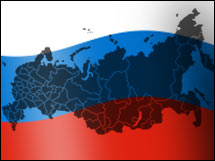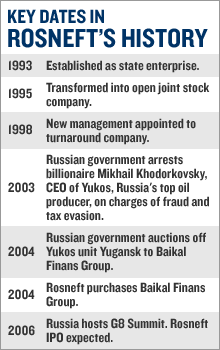|
For Russia, the IPO that matters State-owned oil company Rosneft's offering may test investors' love for Russia. NEW YORK (CNNMoney.com) -- One of Russia's biggest oil firms is set to go public in the next few weeks in a deal that has it all: risk, political intrigue, and what investors crave - the prospect of great rewards. The sale of state-owned oil firm Rosneft could raise $11 billion or more when it goes public in the next few weeks, which would make it the biggest initial public offering in the oil and gas business.
The sheer size of the deal has grabbed headlines and fixated investors looking for an opportunity to cash in on the gushing oil industry in Russia, the world's second-largest oil producer after Saudi Arabia. The IPO, which is expected to coincide with Russia's hosting of the G8 Summit in St. Petersburg later this month, also will be an opportunity for the Kremlin to flex its economic might in front of its Western peers. The Rosneft IPO is very much connected to the image Russia is presenting at the G8, according to Clifford Gaddy, a senior fellow at the Brookings Institution who specializes in the Russian economy. "What [Russian President Vladimir] Putin is trying to do at the G8 is legitimize Russia, to show that Russia is back to resume its status as one of the real powers in the world," he said. But the offering will come at a challenging time for Russia's evolving financial markets. The recent sell-off in emerging markets has seen the country's benchmark stock index tumble 13 percent since May. "This will be the largest ever energy-related IPO so performance could very well be a test case for the Russian market going forward," said Richard Peterson, chief market strategist at Thomson Financial. Rosneft's shares are estimated to price between $5.85 to $7.85 a share, according to deal tracker Dealogic. The number of shares to be offered hasn't been set yet, but Rosneft expects to raise anywhere from $8.5 billion to $11.6 billion, Reuters reported, citing company statements. A dual listing on the London and Moscow stock exchanges is expected before the end of the month. Rosneft's rise Oil hit a record high of $75.19 on Wednesday, which could provide fuel for the Rosneft deal, but concerns over Russia's rocky transition to Western-style capitalism could deter investors. The Moscow-based company was propelled to the upper tier of Russia's oil industry after it bought the assets of Yugansk, a unit of oil giant Yukos. The Kremlin dismembered Yukos and sold the oil firm's assets - at prices some analysts say were far below market value - after the government jailed CEO and billionaire Mikhail Khodorkovsky in 2003 on charges of fraud and tax evasion, creating an uproar among Yukos shareholders. At the time of his arrest, Khodorkovsky was Russia's richest man. He also was a supporter of political groups that opposed the government's policies, and his political activism is believed to have attracted the displeasure of the Kremlin. His arrest has been viewed by many Russia watchers in the West as a sign of the opaque nature of doing business in Russia and raised concerns that the new Russia may not be all that different from Soviet Russia. The 2004 murder of Forbes Russia editor Paul Klebnikov, who investigated corruption in Russian business and politics, also deepened concerns about Russia's commitment to Western openness and a free media. "Right after the Yukos incident a lot of people vowed they would not go back in and buy in Russia again, but it seems like investors are flocking back. Memories fade and people are willing to forgive," said Arijit Dutta, a mutual fund analyst at Morningstar. Many investors are willing to shoulder the risk of buying Rosneft because of the prospect of big rewards, Thomson's Peterson added. He expects pension and hedge funds to be big buyers and said other oil majors could invest as well. Economic boom Part of the reason investors still see strength: Russia's economy is booming. Gross domestic product, the broadest measure of a nation's economic activity, is expected to grow 6 percent this year, far outpacing growth among the G8 nations. There is a huge sense of opportunity in Russia right now, according to Patricia Cloherty, whose private equity firm Delta Capital Management has invested $400 million in the country. "The Russian people are basically building their economy from scratch," she said. Investors around the world have been fleeing emerging markets recently, but Dutta from Morningstar said despite the slump, fund managers still see fundamental strength in emerging market economies like Russia. "They haven't necessarily changed their view on a lot of these stocks. They still see a lot of opportunity in terms of long-term growth," he said. And some of the very features of the Russian economy that might diminish its allure for some investors - weak corporate governance standards, the dispute over the Yugansk assets and other risks - actually attract other investors, said Gaddy at Brookings. "Russia has an aura of mystery and risk - that's part of its attraction. That risk margin has always been true for Russia," he said. Related: Money man gets Kremlin cold shoulder Plus: More worldbiz news |
|



